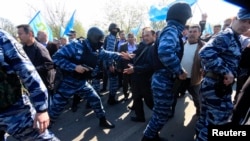Russia must investigate the deaths and abductions of activists in Crimea who have opposed Moscow's annexation of the peninsula and ensure the rights of minorities and media are respected, a leading European human rights watchdog said on Monday.
In a 16-page report, the Council of Europe's Commissioner for Human Rights Nils Muiznieks highlighted the cases of three missing civil society activists and the deaths of local residents, including a teenager, since Russia took over Crimea.
He also expressed concern about the treatment of Ukrainians and of Crimea's Tatars, the Muslim ethnic minority which largely boycotted a controversial March 16 referendum that produced an overwhelming vote in favor of returning the peninsula to Russia.
“All cases of serious human rights violations that have occurred in Crimea since February 2014, including the recent cases of abductions, must be effectively investigated and those responsible held accountable,” he said in a statement.
The report noted the death of 16-year old student activist, Mark Ivanyuk, who died in unclear circumstances in what local police said was a hit-and-run accident.
It also called the murder of Reshat Ametov, an ethnic Tatar in his 30s, who was found dead with signs of torture in March, one of the gravest rights abuse cases in Crimea.
Activists missing
Three activists - Leonid Korzh, Timur Shaimardanov and Seiran Zinedinov - have been missing since May, the report said.
Freedom of speech has been undermined in Crimea in recent months, it said, with certain media outlets critical of the annexation being either relocated or closed down.
Russia's annexation of Crimea triggered the worst East-West crisis since the Cold War. The West accuses Russia of invading foreign territory while Moscow says it accepted the will of the people in Crimea.
Many Crimean Tatars wanted Crimea to remain in Ukraine.
Moscow has banned Mustafa Dzhemilev, a leading Tatar, from returning to the peninsula from the mainland, and outlawed commemorations of Stalin's persecution of Tatars in a clear signal no dissent would be tolerated.
U.N. monitors said in May serious human rights problems were emerging in Crimea and expressed concern about the treatment of religious and ethnic minorities, among others.





